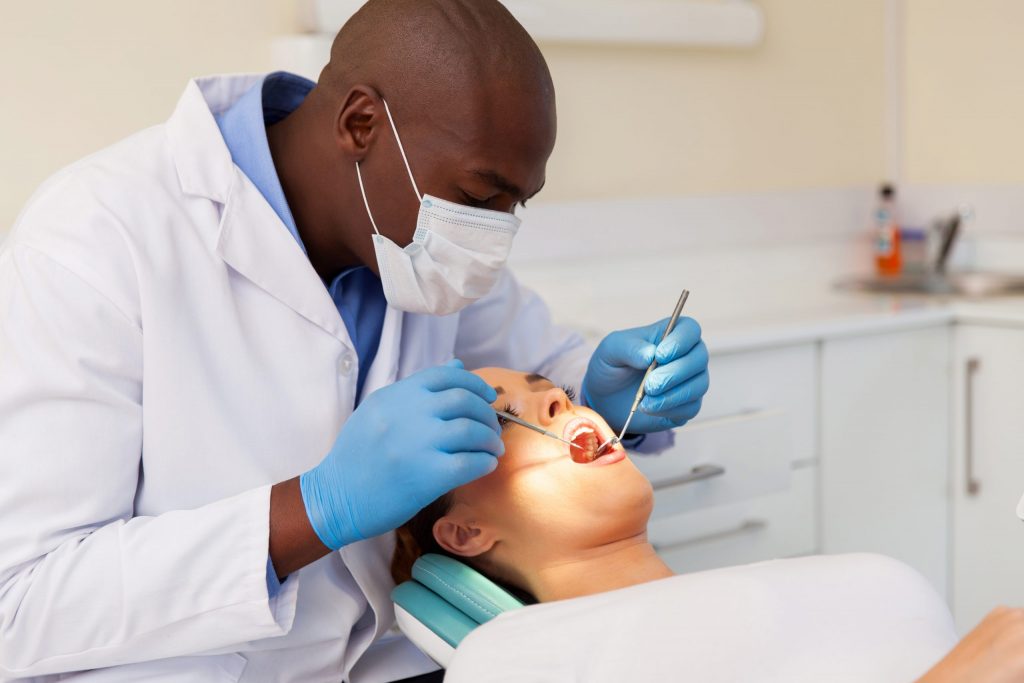A Guide to Typical Dental Conditions That Need a Dental professional's Treatment
Toothaches, for instance, can be symptomatic of serious issues such as cavities, fractured teeth, or abscesses, each calling for certain interventions like fillings or origin canals. Affected wisdom teeth and jaw problems can present significant pain and difficulties.
Toothaches
Toothaches are a common oral problem that can vary from moderate pain to severe discomfort, often indicating an underlying issue that requires specialist focus. This pain can stem from a variety of sources, consisting of oral cavities, split or fractured teeth, and dental abscesses. Each of these conditions postures significant threats if left untreated, possibly causing a lot more severe issues.
Tooth decays, also recognized as decays, are brought on by the buildup of plaque that wears down tooth enamel, causing holes or pits in the affected teeth (eugene dentist). Cracked or fractured teeth, on the various other hand, might arise from injury, grinding, or attacking right into difficult things. These architectural problems can subject the sensitive inner layers of the tooth, triggering sharp pain and increasing the risk of infection. Abscesses hurt infections at the origin of a tooth or between the gum and a tooth, generally resulting from extreme decay or unattended tooth cavities.
Efficient treatment of toothaches entails dealing with the origin reason. This may consist of dental fillings for cavities, crowns for fractured teeth, or root canals and anti-biotics for abscesses. Early intervention by a dental specialist can avoid further damage and ease discomfort, guaranteeing optimal oral wellness.
Gum Tissue Illness
Gum tissue condition, a prevalent yet commonly overlooked oral problem, manifests through inflammation and infection of the gums and supporting tissues. If left neglected, gingivitis can advance to periodontitis, an extra extreme kind identified by the devastation of the sustaining bone and connective cells, inevitably leading to tooth loss.
The key reason of gum tissue condition is microbial plaque, a sticky, anemic movie that regularly develops on teeth. Poor oral hygiene, cigarette smoking, genetic predisposition, and certain medical problems, such as diabetes mellitus, can aggravate the danger of establishing periodontal disease. Regular oral exams are critical for very early detection and management of this condition.
Therapy for periodontal illness ranges from specialist oral cleaning and scaling to more sophisticated treatments like root planing and gum surgical procedure, relying on the seriousness. Maintaining excellent oral health methods, including cleaning twice daily, flossing, and using an antiseptic mouth wash, can substantially reduce the risk of periodontal illness and promote healthier gum tissues.
Tooth Cavities
Tooth cavities, also called tooth decays, are a typical oral condition identified by the damage of tooth enamel as a result of acid-producing germs in the mouth. These microorganisms flourish on sugars and starches from food and drinks, producing acids that slowly erode the enamel, causing cavity development.
Early-stage cavities might not show signs, yet as they progress, they can trigger tooth pain, sensitivity to warm or cold, noticeable openings or pits in the teeth, and staining. If left unattended, cavities can permeate much deeper site link layers of the tooth, potentially leading to extreme discomfort, infection, and even tooth loss.
Protecting against cavities includes a mix of good oral hygiene methods and nutritional habits. Routine cleaning with fluoride toothpaste, flossing, and regular oral examinations are critical. Dental practitioners might additionally recommend additional precautionary actions, such as fluoride treatments and dental sealants, to secure teeth from decay.
Minor cavities can be addressed with oral fillings, which bring back the tooth's structure. Much more advanced instances might require crowns or even origin canal treatment if the degeneration has reached the tooth's pulp.

Impacted Wisdom Teeth
Affected knowledge teeth are a prevalent dental concern that occurs when the third molars, frequently described as knowledge teeth, fail to fully emerge or line up correctly within the mouth. This problem often results from inadequate area in the jaw or an uncommon development angle of the teeth. additional resources Impacted wisdom teeth can result in a range of issues, consisting of infection, discomfort, and damages to surrounding teeth.
When knowledge teeth come to be influenced, they are usually partially erupted or remain entirely beneath the gum line. This partial eruption can create a pathway for bacteria to enter the gum tissues, leading to infections that manifest as swelling, discomfort, and also high temperature. Furthermore, affected wisdom teeth can exert stress on bordering teeth, potentially triggering crowding or changing.
A comprehensive dental evaluation, generally involving X-rays, is important for diagnosing influenced knowledge teeth. Treatment typically involves surgical extraction, carried out by a dental specialist. The treatment intends to ease pain and prevent more complications, such as cysts or damage to bordering bone structures. Post-operative care is vital to make sure appropriate recovery and decrease the threat of infection. find out this here Routine dental exams are suggested to check the problem and maintain dental wellness.
Jaw Disorders
Jaw problems, jointly referred to as temporomandibular joint (TMJ) problems, incorporate a range of problems that affect the jaw joint and surrounding muscles. These problems can manifest with signs and symptoms such as pain or inflammation in the jaw, difficulty chewing, a standing out or clicking sound when shutting the mouth or opening, and also chronic migraines. TMJ conditions can occur from various aspects, consisting of arthritis, jaw injury, or regular habits like teeth grinding or jaw clenching.
Medical diagnosis of TMJ disorders commonly includes an extensive analysis by a dental professional, consisting of a physical evaluation of the jaw, oral X-rays, and sometimes advanced imaging techniques like MRI or CT checks to evaluate the joint's problem. Therapy alternatives differ depending upon the extent of the disorder. Non-invasive approaches such as physical therapy, dental splints, and medications focused on decreasing swelling and pain are commonly first-line therapies. In extra extreme situations, medical treatments might be needed to deal with architectural problems within the joint.
Early intervention by a dental professional is crucial to stop the progression of TMJ disorders and to keep total dental wellness. People experiencing consistent jaw pain or disorder need to look for timely examination and therapy.
Verdict
Toothaches usually indicate underlying problems such as dental caries, cracked teeth, or abscesses, needing punctual treatment. Impacted wisdom teeth and jaw conditions additionally require expert interest to relieve pain and avoid additional difficulties.
Dental cavities, likewise understood as cavities, are created by the accumulation of plaque that deteriorates tooth enamel, leading to openings or pits in the impacted teeth. Abscesses are agonizing infections at the root of a tooth or between the periodontal and a tooth, usually resulting from extreme decay or neglected tooth cavities.

In addition, impacted wisdom teeth can apply pressure on surrounding teeth, possibly causing crowding or moving.